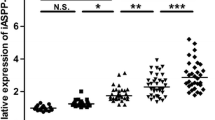Summary
To evaluate the effects of wild-type p53 gene on the growth and chemotherapeutic sensitivity of human glioma cells, plasmid PC53-SN3 carrying wild-type p53 gene was transfected into U251 cells. p53 gene expression in transfected cells was detected by RT-PCR, the cell growth inhibition and apoptosis in either the absence or the presence of cisplatin was assessed by MTT and flow cytometry. The transfection of p53 gene into U251 cells was confirmed by RT-PCR. MTT showed that p53 gene by itself induced strong inhibition effect on the growth of U251 cells [inhibition rate, IR (79.60±5.69) %]. The killing effects of cisplatin by itself on U251 cells was not strong [IR with the increase of cisplatin concentration (1, 2, 4, 8 μg/ml). When combined treatment of wild-type p53 gene transfection and cisplatin was used, that was significantly increased [IR (91.64±1.00) %, (94.98±1.67) %, (95.32±2.01) %, (95.65±1.00) %]. The apoptosis rate of U251 cells induced by p53 gene transfection was 17.38%. That induced by cisplatin increased (5.71%, 5.93%, 6.27%, and 6.81%) with the increase of cisplatin concentration (1, 2, 4, 8 μg/ml). The apoptosis rate was also significantly increased (23.50%, 23.54%, 23.89%, and 28.88%) after combined treatment of p53 and cisplatin with different concentration (1, 2, 4, 8 μg/ml). It is concluded that wild-type p53 gene and cisplatin could result in synergistic inhibition effects on the growth of human glioma cells.
Similar content being viewed by others
References
Frankel R H, Bayona W, Koslow Met al. p53 mutations in human malignant gliomas: Comparison of loss of heterozygosity with mutation frequency. Cancer Res, 1992, 52: 1427
Greenblatt M S, Bennett W P, Holistein Met al. Mutations in the p53 tumor suppressor gene clues to cancer etiology and molecular pathogenesis. Cancer Res, 1994, 54: 4855
Lowe S W, Ruley H E, Jacks Tet al. p53-dependent apoptosis modulates the cytotoxicity of anticancer agents. Cell, 1993, 74: 957
Gomez-Manzano C, Fueyo J, Kyritsis A Pet al. Adenovirus-mediated transfer of the p53 gene produces rapid and generalized death of human glioma cells via apoptosis. Cancer Res, 1996, 56: 694
Gomez-Manzano C, Fueyo J, Kyritsis A Pet al. Characterization of p53 and p21 functional interactions in glioma cells en route to apoptosis. J Natl Cancer Inst, 1997, 89: 1036
Gjerset R A, Turla S T, Sobol R Eet al. Use of wild-type p53 to achieve complete treatment sensitization of tumor cells expressing endogenous mutant p53. Mol Carcinog, 1995, 14: 275
Blagoskonny M V, El-Deiry W S. Acute overexpression of wt p53 facilitates anticancer drug-induced death of cancer and normal cells. Int J Cancer, 1998, 75: 933
Lane D P. P53, guardian of the genome. Nature, 1992, 358: 15
Author information
Authors and Affiliations
Additional information
XIANG Wei, male, born in 1973, M. D., Ph.D.
Rights and permissions
About this article
Cite this article
Wei, X., Xianli, Z. & Hongyang, Z. The effects of wild-type p53 gene transfection on the growth and chemotherapeutic sensitivity of human glioma cells. Current Medical Science 22, 44–46 (2002). https://doi.org/10.1007/BF02904786
Received:
Published:
Issue Date:
DOI: https://doi.org/10.1007/BF02904786




